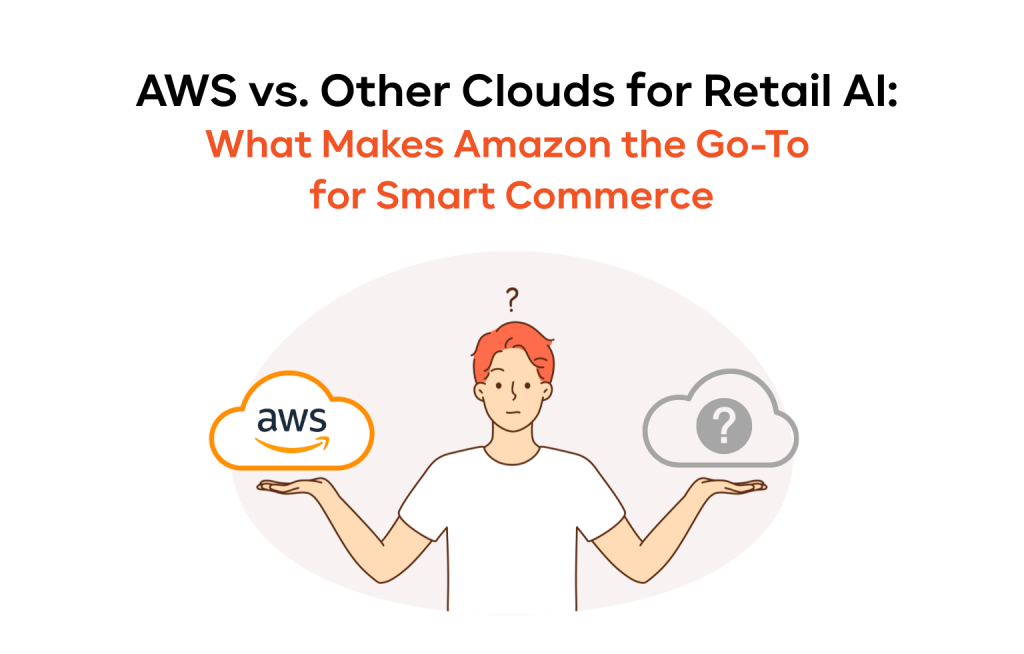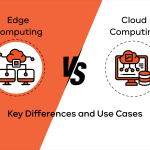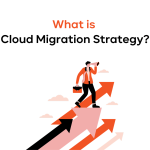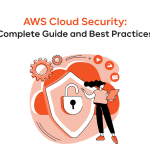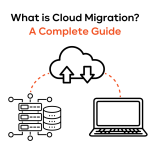Retail is always changing. Today, artificial intelligence is the big driver of that change. AI supports everything from predicting the next big trend to personalizing each shopper’s experience. It has already become essential for businesses to succeed and expand. As stores rush to use AI, they face a big question: which cloud platform should they use to make it all happen?
The choice usually comes down to three major players: Amazon Web Services (AWS), Microsoft Azure, and Google Cloud Platform (GCP). All of them offer amazing computing power and AI services. But many retailers are choosing AWS for a reason. Choosing the right cloud provider is important. It impacts everything from customer experience to supply chain efficiency and fraud prevention.
This article examines how AWS competitors stack up in the field of retail AI. We’ll explore the AWS tools that help stores gain a competitive edge. We want to provide you with a clear guide to help you make the best choice for your business.
Retail AI adoption is booming – but which cloud leads the way?
A Gartner study found that 91% of retail IT leaders see AI as their top tech priority.
Cloud platforms are the engines that make this AI transformation possible. They provide the flexible and real-time infrastructure needed for AI to work. This kicked off a rivalry between AWS, Azure, and GCP. While each offers strong AI and ML tools, their capabilities differ when it comes to meeting retail requirements.
Each provider has great AI and machine learning tools, but they aren’t all the same when it comes to retail needs.
AWS started as part of Amazon.com, the online retail giant. This gives it a home-field advantage. Its services are often built on the same tech that powers one of the world’s biggest stores. Because of this, AWS deeply understands retail problems, from managing inventory to knowing how customers shop. While AWS holds a 31% share of the total cloud market, its role in retail AI is even stronger.
What retailers need from an AI cloud platform
When it comes to retail AI, picking a cloud isn’t only about power. It’s about finding a partner that gets what your industry needs. Here are the key things retailers should look for.
Accelerated time-to-value with managed AI services
Retailers need results fast. They can’t spend years building complex machine learning models from scratch. This is where managed AI services make a huge difference. Instead of hiring a big team of data scientists, you can use pre-built models for tasks like personalization.
Services like Amazon Personalize and Amazon Forecast let you skip the hard part of building models and start delivering value right away.
Seamless integration with data sources, APIs, and supply chains
Retail data is often a mess. Sales, inventory, customer details, and shipping each sit in their separate systems. A good AI plan needs to pull all this scattered data together. A strong cloud platform must offer good tools and clear paths to connect everything.
AWS has tools like AWS Glue to bring data together, Amazon S3 for storage, and Amazon API Gateway to manage the connections.
Enterprise-grade security and compliance (PCI DSS, GDPR, etc.)
For retailers, data security is everything. You handle sensitive customer and payment info, so you have to follow strict rules like PCI DSS and GDPR. You need a cloud provider that is certified and gives you tools to control who sees what data.
AWS has a long history of meeting these standards and provides tools like AWS Identity and Access Management (IAM) to lock down your security.
Cost-effective infrastructure with autoscaling and global reach
Retail sales go up and down. Think about the holiday season. Your infrastructure needs to grow to handle the rush and shrink to save money when things are quiet. If you operate globally, your site must be fast for customers everywhere.
AWS was designed for this. It has autoscaling to adjust to traffic, a global network to deliver content quickly, and spot instances to lower the cost of AI training.
DevOps-ready environment for fast deployment and continuous improvement
The ability to update your AI features quickly is a big plus in retail. You need a setup that lets you test and release new code smoothly and automatically. Your cloud platform should work well with common DevOps tools like Jenkins and Terraform.
With support for these tools and its own offerings, AWS helps you bring new features to market faster.
AWS vs. other clouds: High-level comparison for retail AI
Let’s compare AWS, GCP, and Azure. They have different strengths for retail AI. All are great platforms, but AWS often provides more tools than AWS competitors, which are built specifically for retail.
Retail-focused AI services of AWS, Google Cloud, and Azure
AWS has AI services that feel like they were made for retailers. Amazon Personalize gives you smart recommendations, just like on Amazon.com. Amazon Forecast helps you predict demand.
Google Cloud’s AI tools are powerful but more general; you have to do more work to make them fit retail. Microsoft Azure is also strong, but it focuses more on general business solutions.
The ease of integration (ERP, CRM) of AWS, Google Cloud, and Azure
With tools such as AWS Lambda and API Gateway, AWS simplifies integration with different sales and customer platforms.
Google Cloud works best for those already in the Google ecosystem. If your company relies on Microsoft tools such as Dynamics 365, Azure is often the most suitable option.
Security/compliance features of AWS, Google Cloud, and Azure
Amazon Web Services and AWS competitors maintain excellent security. They comply with major standards such as PCI DSS and HIPAA. AWS has a proven and trusted history that appeals to many retailers.
Google Cloud also has strong compliance, and Azure is a choice for big companies that already use Microsoft’s security tools.
Cost-efficiency of AWS, Google Cloud, and Azure
Cost can be tricky and depends on how you use the platform. AWS gives you lots of pricing options, like spot instances that save money on AI training.
What about AWS competitors? Google Cloud can sometimes cost more, though it offers discounts if you use it a lot. Azure can be a good deal if you already have a Microsoft enterprise agreement.
DevOps/infrastructure tools of AWS, Google Cloud, and Azure
AWS has a large and mature set of DevOps tools, including CloudFormation and strong support for tools like Terraform.
Google Cloud has its own tools, like Cloud Build and also works well with Terraform. Azure has a great tool called Azure DevOps.
All AWS competitors get the job done. However, since AWS has been around the longest, there’s a huge community to help you solve problems.
| Feature | AWS | Google Cloud | Microsoft Azure |
| Retail-focused AI services | ✅ Great (Personalize, Forecast) | ⚠️ General ML tools | ⚠️ Not retail-specific |
| Ease of integration (ERP, CRM) | ✅ Flexible (Lambda, API Gateway) | ⚠️ Best with Google tools | ✅ Good for Microsoft shops |
| Security/Compliance | ✅ Proven (PCI DSS, HIPAA) | ✅ Strong & regional | ✅ Great for enterprises |
| Cost-efficiency | ✅ Flexible (Spot, serverless) | ⚠️ Can be premium | ⚠️ Varies with licenses |
| DevOps/Infra tools | ✅ Mature (Terraform, CDK) | ✅ Good (Terraform, Cloud Build) | ✅ Strong (Azure DevOps) |
_______________________________________________________________________
Need help using AWS AI tools for your retail business?
IT-Magic is here for you. Schedule a free consultation, and we’ll work with you to create the ideal AI strategy for your store.
_______________________________________________________________________
Unique AWS services that give retailers an edge
What makes Amazon Web Services stand out from AWS competitors is its special services that solve common retail problems. These tools help you innovate faster, even if you don’t have a team of AI experts.
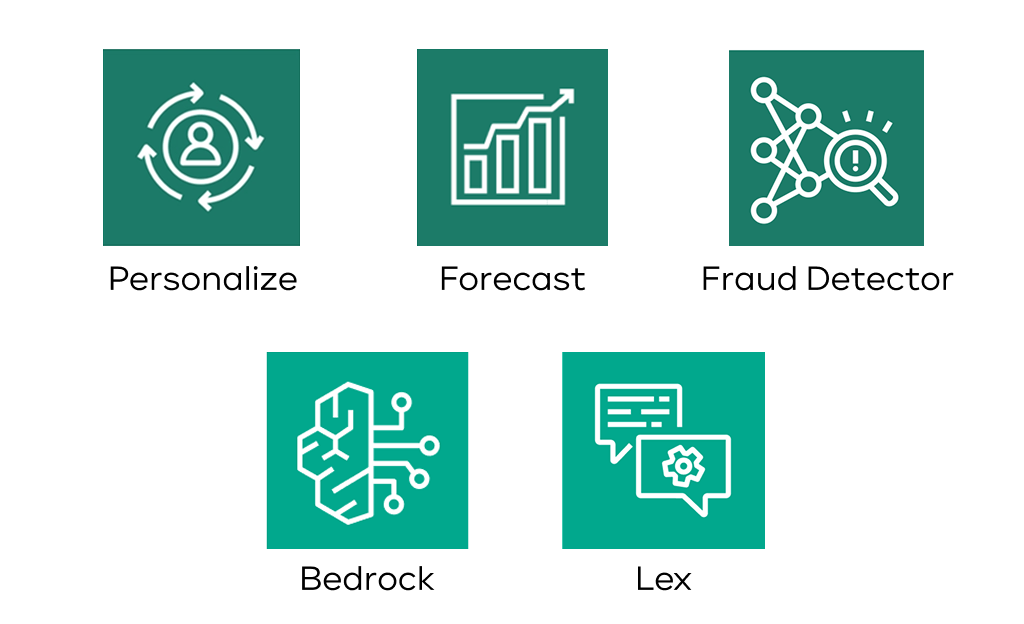
Amazon Personalize
Easily enhance your app with intelligent product suggestions using Amazon Personalize. The technology behind it is the same one Amazon.com relies on to suggest items to its vast customer base.
It offers much more than a simple “people also bought” feature. It watches what a user does in real time – what they click on, search for, and add to their cart. Then, it gives them personal recommendations instantly.
No expertise is required to use it. You’re able to train models without doing any machine learning programming. But you still have the power to add your own business rules and filters to get the results you want.
Personalize can pull in data from many places, like user profiles and purchase histories. It works smoothly with data stored in Amazon S3 or Amazon Redshift, giving it a full picture of your customers and products.
Amazon Forecast
Amazon Forecast uses machine learning to predict future business trends, using the same technology that Amazon uses to manage its massive inventory.
You can use this service to predict how much of a product you’ll sell, how much inventory you’ll need, and even what prices to set. Good forecasts mean less waste and happier customers.
Forecast is smart. It knows that holidays, sales, and other events change how people shop. It automatically includes these factors in its predictions, which makes them much more accurate.
If your data is already on AWS, getting started is a breeze. You can import your historical data right from Amazon S3 or Redshift and start getting forecasts quickly.
Amazon Fraud Detector
This service helps you spot shady online activity, like payment fraud or fake accounts, before it becomes a problem.
Fraud Detector can check transactions as they happen and give them a risk score. This adds a strong layer of security to your checkout process without you having to build your own fraud models.
They draw on over two decades of Amazon.com’s expertise in fraud prevention. This gives you access to world-class fraud detection that would be almost impossible to build yourself.
Amazon Lex
Amazon Lex is a service that lets you build chatbots that can talk and text with your customers.
You can use Lex to create helpful bots for customer service or in-app support. These bots can understand normal language and have realistic conversations.
You can connect Lex to other AWS services like AWS Lambda. This lets your bot do things like look up an order or start a return, offering your customers help 24/7.
Amazon Bedrock
Amazon Bedrock provides seamless access to advanced generative AI models from leading companies like Anthropic and Meta, all through one simple connection.
This service makes using generative AI easy. Instead of working with many different AI companies, you can try out different models through one API to see which works best.
Bedrock is great for tasks like writing product descriptions automatically or creating smarter chatbots. It handles all the complex technical stuff behind the scenes, so you can focus on creating great experiences.
DevOps and infrastructure benefits of choosing AWS
Beyond its AI tools, AWS gives you a solid platform for building and running your apps. This is a huge plus for retailers who need to move fast without breaking things.
Complete Infrastructure as Code using Terraform, CDK, or CloudFormation
Infrastructure as code lets you manage your cloud setup using code files. It’s like a blueprint for your system. Tools like AWS CloudFormation and support for Terraform let you build and copy your AI pipelines easily. This makes deploying new features faster and more reliable.
Integrated monitoring through CloudWatch and X-Ray
It’s important to know whether your AI models are performing effectively. AWS gives you tools like Amazon CloudWatch to track performance and AWS X-Ray to find and fix problems. These services give you a clear view of how your AI systems are running.
Scalable event-driven architecture with Lambda, SQS, and Step Functions
Modern applications often work based on events. For instance, if a shopper abandons their cart, an event can be set to trigger a follow-up email. AWS is great at this, with services like AWS Lambda for serverless computing and SQS for managing workflows.
Rapid deployment pipelines via CodePipeline or GitHub Actions
Being able to release new AI features all the time is a big advantage. With AWS CodePipeline and GitHub Actions support, you can automate your release workflow. This lets you build and deliver new AI features safely and quickly.
Why our clients choose AWS over other clouds
We’ve seen why so many of our retail clients pick AWS over Amazon AWS competitors. Their reasons are often very practical and based on real-world business needs.
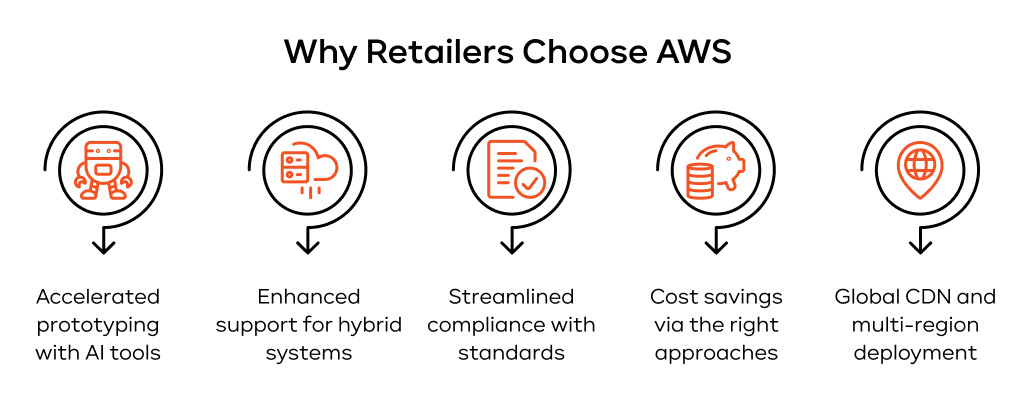
Accelerated prototyping using ready-to-use AI tools
Our clients often tell us they choose AWS because they can build and test new ideas so quickly. Tools like Amazon Personalize mean they don’t have to begin from scratch. This saves a lot of time and lets them see what works with customers faster than their competitors to AWS.
Enhanced support for hybrid systems like e-commerce, ERP, and fulfillment
Many retailers don’t run everything in the cloud. They often have a mix of older systems and new cloud applications. AWS is known for its great support of these mixed setups. It helps them connect everything, which is a big reason they choose it over Amazon cloud competitors.
Streamlined compliance with PCI DSS and other standards
Meeting rules like PCI DSS can be a headache. Our clients love that AWS makes this easier. The tools and documents AWS provides mean less time spent on audits and more time spent on growing the business.
Cost savings via spot instances, serverless computing, and autoscaling
Cost is always a big factor. Our clients save money on AWS by using things like spot instances for certain tasks, serverless tools so they only pay for what they use, and autoscaling so their costs match their traffic. This kind of control over spending is a major plus compared to some AWS cloud competitors.
Global CDN and multi-region deployment for fast, low-latency user experience
For our clients who sell in different countries, the global reach of AWS is key. They use the Amazon CloudFront network to make sure their website is fast for customers everywhere in the world.
When other clouds might be a better fit
AWS is a great choice for many retailers, but it’s not the only choice. It’s fair to admit that sometimes, AWS competitors make more sense.
Strong commitment to the Microsoft ecosystem
If your company already uses a lot of Microsoft tools – like Microsoft 365 or Dynamics 365 – then Azure might be an easier fit. The way Azure works with other Microsoft products can make life simpler for your team.
Requirement for Google-native ML integrations with BigQuery
If your business is all about data analytics and you use Google’s BigQuery as your main data warehouse, then Google Cloud is a very strong contender. Its tools are designed for flawless compatibility with BigQuery.
AWS often acts as the AI sidecar or inference engine in multi-cloud setups
We’re also seeing more companies use a multi-cloud approach. They might use Azure or GCP for most of their needs, but use AWS just for its powerful AI tools. This shows that even in a mixed environment, its AI services stand out from the offerings of AWS competitors.
Final thoughts: AWS as the smart retailer’s AI engine
To succeed today, retailers need to use AI. The cloud platform they choose is one of the biggest decisions they’ll make. And while there are good AWS competitors out there, Amazon Web Services often comes out on top for retail AI.
It’s mature, has AI tools built for retail, connects well with other systems, and offers ways to control costs. For businesses that want to grow, offer personalized experiences, and move fast, AWS is a powerful engine for smart commerce.
Fuel your retail AI plan with AWS!
Book a consultation and receive expert advice and hands-on help for every step of your cloud journey. Contact us today to get started.
FAQ
Can AWS AI services integrate easily with existing ERP, e-commerce, and supply chain systems?
Yes. AWS is built to connect with other systems. It offers APIs, connectors, and data pipeline services like AWS Glue and AppFlow that let you bring data together from all parts of your business.
Are there any limitations to using AWS AI tools in hybrid or multi-cloud environments?
The main challenge is usually the complexity of connecting everything. But AWS provides services like AWS Direct Connect and DataSync to help link your on-premise systems to the cloud. It takes some planning, but you can definitely use AWS AI tools as part of a larger multi-cloud plan.
Can retailers build AI chatbots without deep machine learning expertise using AWS?
Absolutely. Amazon Lex was made for this. It gives you a simple interface to build, test, and launch smart chatbots. You can create great conversational experiences for your customers without needing a deep background in machine learning.
